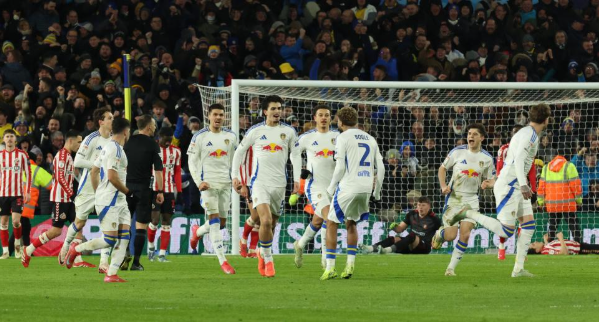
Why do Sunderland concede so many stoppage-time goals?
SUNDERLAND’S concession of a decisive goal at Leeds United on Monday evening might have come at an extremely late stage of the game, but it was hardly unexpected. On far too many occasions this season, the Black Cats have been cursing the impact of letting in a last-gasp goal.
In the first 80 minutes of all their Championship matches this season, Sunderland have scored 43 goals and conceded 20. From the 80th minute onwards, however, they have scored on seven occasions and conceded on ten. If every Championship game was split into ten-minute chunks, it would only be the final one when Sunderland were statistically more likely to concede a goal than to score one.
Crunch the numbers from the 90th minute onwards, and the statistics are even more alarming for Regis Le Bris and his players. Monday’s game was the seventh this season in which Sunderland have conceded a goal in second-half stoppage time. All bar one of those concessions have cost the Black Cats at least a point, with the seven stoppage-time goals they have conceded robbing Sunderland of a total of nine points. Add nine to their current points tally, and they would be sitting in second position.
“For sure, it is something we have to improve,” admitted Le Bris, when asked whether Sunderland’s damaging habit of conceding late goals was in danger of costing them promotion. “But it’s not so simple that there is just one reason that it happens.
“Also, we have scored late goals as well. At one point, we were talking about how we were starting games, so it’s not always connected. But at the same time, it’s clear that the last stage of games is somewhere where we have lost many points.”
The key question is why Sunderland have proved so vulnerable late in a game. Fatigue? On pretty much every available metric, the Black Cats come out as one of the fittest sides in the league. Poor game management? There have certainly been matches, Plymouth at home being a prime example, where Sunderland’s players have appeared flummoxed in the closing stages, unsure whether to push forward to see a game out or sit back in an attempt to shackle the opposition. A lack of leadership? The youthfulness of Sunderland’s squad can be a virtue, but perhaps there are also times when it counts against them.
Clearly, there are a myriad of factors at play, with a vulnerability in the latter stages of a game becoming something of a self-fulfilling prophecy. The more that late goals go in, the more everyone associated with Sunderland starts wondering if another one is just around the corner. Jangling nerves weren’t the reason the Black Cats conceded in the 95th minute at Elland Road on Monday, but they almost certainly didn’t help.
Le Bris has spent the last few days discussing events at Leeds with his players, and feels a collective lack of experience in high-pressure situations was an important factor in the way things unfolded.
“I think it’s probably connected to the experience of the team,” said the Sunderland boss. “When you are young, you need to go through these experiences to find the right behaviours later. I’m not sure that when you are 17,19,20… you can face these challenges so easily, you have to learn.
“We have spoken with many players about this problem, and I think they understand when we talk here in the video analysis room or in the dressing room. But out on the pitch, it is never so simple. With the momentum, the crowd, the emotions – you have to experience this and learn.”
And while Sunderland’s players were understandably despondent in the immediate aftermath of Monday’s defeat, Le Bris is confident it will not have inflicted any lasting damage.
“You need positive and negative experiences to grow,” he said. “If they want to have a great career, they will have low points in their learning curves. I think the best players are the ones who can suffer and fail, but then at the same time, they can learn very quickly and be back to their best level.”

Leave a Reply